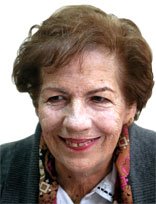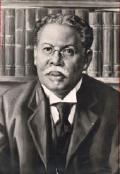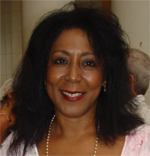I think that I was born with the vocation for being a radio announcer. I remember my the school on the block, where I studied the primary school and my teacher Olga Rivero who made me read in class, because I was good at it, she said.
Where were you born and where did you live your childhood?
I was born in Ciego de Ávila, in the bosom of a very humble family, which could give my brother and me a happy childhood, with much love and dedication.
I imagine that given the resources of the family and the epoch in which it happened, you couldn’t study at the University.
Indeed, at the age of twelve, in 1945, I was obliged to interrupt my studies and work to help my family economy. I remember that my first job was in a coffee company called El Penon, which had its headquarters in Camagüey city. I did almost everything, from cleaning the place up to delivering coffee to the customers, for only six pesos a month. Afterwards I was employed as a salesclerk in a store, in offices and in other premises. As far as my situation improved, I enrolled and studied in private academies in the evenings.
And when does Fernando Alcorta stand up in front of a microphone for the first time?
First of all I have to tell you that from my childhood, radio programs were my passion. I remember that he listened to Moncada, Los Tres Villalobos, El derecho de nacer ….. I enjoyed listening to Ibrahim Urbino, Manolo Serrano, Jorge Luis Nieto, Rosendo Rosell, Cepero Brito and other excellent radio announcers, especially from CMQ and Cadena Azul … And German Pinelli who was the big teacher of all of us.
It was exactly in the year 1950 and it happened at random. Dr Jose Leal, the owner of the drugstore where I was working decided to create a baseball team, and one of the teammates conducted a sports program in CMJH. One day he needed an assistant and I volunteered. This was the first time I took part in a radio program.
Did you continue working on the radio?
No, not at all. I had an uncle who was a food supplier in Camagüey. He wanted me to follow the trade, so I moved to Camagüey and started
There I made some sale management for a year and a half, but in spite of my efforts I failed. Obviously, I wasn’t made for that business.
Aside from your failure as a salesman, what memories do you keep of Camagüey?
I don’t have fond memories of those years. The coup d’état of dictator Fulgencio Batista caught me in Camagüey. I remembered that I spontaneously joined a demonstration that took place in front of the City Council on Cisneros Street. I was only 19 years old and had no idea of that but I rejected this event because I felt that that was something very bad for Cuba.
And do you continue in Camagüey?
No. I returned to Ciego de Avila and then I fully devoted myself to the radio. It happened that my cousin Orlando Castellanos, who was already an acclaimed radio announcer in Ciego de Avila, had an advertising agency with an excellent programming. Well, Orlando called me and said: Hey “Maquito” (as Andalusia grandmother used to call me) realize how well you read and the rhythm of your voice, also your pronunciation is excellent, you could work in the radio.
And: what happens then?
That was unbelievable; I began to ask him insistently an opportunity to appear in his programming. He was very interested in helping, but he had to act with caution, because the programs were commercial sponsored and the advertisers demanded a high quality and even selected the radio announcers. But I succeed.
Do you remember your first program on the radio?
My debut was in 1952 in the program Melodias de las 7:45. From that moment only one thought cheered me up “being a good radio announcer.” I was so interested in the job that I used to go to CMJH radio station and talked and talked, and I took no interest in the payment. My only concern was to be an excellent radio announcer.
When we celebrate in Ciego de Ávila the 50th Anniversary of Radio Cuba, I knew that you appear in the list of founders. What do you remember from that time?
The CMJP, Radio Cuba, was opened on October 10th, 1952, in Ciego de Avila and Orlando Castellanos, with all his experience as an advertiser began to work in the radio station and I began with him.
Radio Cuba was a fantastic school because Gustavo Cruz Ramirez, the owner, gave me the chance to learn almost all radio announcing specialties such as commercials, musical programs, interviews, animation, interviews and poetry reading. Gustavo Cruz also contributed to form my political awareness. At that time he belonged to the Directorio Revolucionario in Ciego de Ávila, and I suddenly got involved in the conspirations against the dictatorship that oppressed the nation. Consequently, the radio station became a revolutionary hotbed and was often visited by provincial and national leaders of the organizations.
Does Radio Cuba make something during the 9th April strike in 1958?
Of course. I was designed to deal with all preparations for the general strike, which appeal would be broadcast through the radio. We went over to the Cuban National Circuit and broadcast the remarks by Wilfredo Rodriguez Cardenas. Immediately after, the sound operator and I picked up a single by Puerto Rican singer Daniel Santos, that goes: – Te metiste a soldado y ahora tienes que aprender – (You became a soldier and now you have to pay for it). We played the record and left the radio station. When the record ended, a scratch began. Of course, I was arrested.
Were you in Ciego de Avila when the Revolution success?
Yes, precisely Ibrahim Ulloa, Laritza’s father and I, broadcast slogans from the radio station and we went over to the National Radio in Sancti Spiritus, which had been captured by rebel forces. I continued working in Radio Rebelde and Radio Cuba now Radio Surco. In those early months I met Orestes Varela, one of Radio Rebelde radio announcers in the Sierra Maestra, who had been appointed to a high position in Ciego de Avila. That was the start of a great friendship.
Why did you move to Havana?
I was in Ciego de Avila until April 1960. As I had told you before, Orlando Castellanos and I we like brothers. Orlando who had already left to Havana city and was in charge of the Programming Department at Union Radio, hired me as a commercial broadcaster for Sugar King Triple A baseball broadcasting. In Union Radio I met worthy comrades with whom I made a great friendship, these people were Gustavo Mazorra, Orlando Fundora, Ramon Alvarez Viejo, Roberto Canela and Miguel Angel de la Guardia…
How long did you work in Union Radio?
Not much because the permission for baseball broadcasting was owned by United States and they cancelled the transmissions.
Can you imagine, I was on the street and Orlando Castellanos, my brother held out his hand to me and went to live at his house on Concha Street in Luyano.
In 1960 you worked in Radio Progreso. How were your beginnings in this radio station?
I have been tested on several radio in Havana and I was called for Radio Progreso, specifically a Cuban country musical show that replaced the program Cantores de Ariguanabo. This program was broadcast live from Studio no. 1 at 6:30 PM. This was exactly on August15th, 1960. My bosses were at the time Leovigildo Diaz de la Nuez, who was chief of programs and Marcos Behmaras, who was the director of Radio Progreso. I struck up a friendship with my colleagues. I would say they were very important during my early days in the capital city.
Who were the outstanding radio announcers in Radio Progreso at that time?
I remembered Juan Manuel Tabares, Oscar Jimenez, Dr. Luis Vilardell, Adalberto Fernández, Gabriel Coderch, Miguel Hernandez, among others. I participated in all the programs, sometimes as I think I was the only radio announcer that worked in almost all the programs until 1993.The radio serial commentator being dramatic programs, specialty I like a lot. I had the opportunity to share with many actors and actresses that admired. Let’s mention two actresses that worked with me in a program written by my friend Alberto Luberta and it had a great audience, the excellent actresses were Martha Velasco.
I remembered your voice in Venceremos radio news. Then you leave Radio Progreso.
No, I did it without leaving Radio Progreso. It was an excellent radio news, directed by Raul Valdes Vivo. I also remembered Jose Antonio Cepero Brito, Nunez de Villavicencio, Jose Armando Vidal and Alicia Fernan who recited poems by Jesus Orta Ruiz, El Indio Nabori.
You are one of the founders of the short wave-international radio station Radio Habana Cuba. What are your memories from those moments?
At the endings of 1960 comrade Pedro Costa was organizing the short wave broadcasting. At the suggestion of Diaz de la Nuez talked with me and invited me to work in what would be our international radio station. I remembered we made a test program with Cesar Portillo de la Luz; singer, Bertha Dupuy and actress and radio announcer Bertina Acevedo and directed by late actor Carlos Mas and Mariano Suarez del Villar as radio music director. We used July 26th March which was played on a xylophone in the Studio 5 in Radio Progreso. The radio station began with a small transmitter located in Bauta but there was not a direct link. The opening program was the News Magazine at 7:00 pm, we had to record the program and take it to the transmitter.
I can imagine the work and the setbacks that this entails.
I remember that once the car that was carrying the recordings had an accident. Luckily my colleagues didn’t suffer major injures, event when it was a tremendous collision.
Radio Havana Cuba was always the name of the radio station?
At the beginning the proposed name was Radio Cuba or Radio Habana. The provisional name was Onda Corta Experimental Cubana. I should say that the working conditions were precarious because we didn’t an appropriate place, as they prepared flats four and five we worked on the premises of Radio Progreso.
What do you remember about the programming?
I had the honor to present Maestro Leo Brouwer who gave guitar concerts. I also participated in the transmission of the rally on the corner of 23 and 12 Streets during the victim’s burials of those who fell during the raid, prior the Bay of Pigs invasion on April 16th 1961. With Orlando Castellanos, who was also founder, we read all Bay of Pig invasion war communiqué. I remember we slept in the radio station. Thus we arrive on May 1st 1961 and together with Castellanos were at the Revolution Square, to celebrate May Day and the victory over the mercenaries in the Bay of Pigs. There Castellanos uttered the inaugural words of our international radio station, which from that day is known as Radio Havana Cuba. They were glorious days I had the good fortune to live; another fortune is having had colleagues such as Angel Hernandez, Bellita Borges and Bertina Acevedo. Lucky for having worked in Radio Havana Cuba since its very beginnings and next to Lilia Rosa López, Maruja Garcia Enrique Lopez, Pepe Aguero, Orlando Castellanos, Pedro Costa and many others, and do so under the direction of Mark Behm, Orlando Fundora and Alfredo Viñas.
In other occasions you have told me about your participation in the creation of the Radio Trade Union.
Indeed. I was Secretary General of the first officially established trade union in Radio Progreso, after 1959. That executive board is also made up by Medardo Montero, Angelo and Juanita Diaz Capdevila. I was also part of the National Council of the National Trade Union of Arts and Spectacles as a founder. The Secretary General was the actor Pedro Alvarez and brought together leading personalities in the artistic world, including Esther Borja.
In your long artistic career, you are witness of important and unforgettable moments. Could you comment some?
I made the presentation of Comrade Fidel Castro in the first graduation of teachers at Ciudad Deportiva (Havana’s Sport Complex). Afterwards, I had the honor to work as a presenter in several appearances he made on Radio Havana Cuba.
Another important moment in my professional life was the welcoming of Yuri Gagarin, the world’s first cosmonaut when he arrived in José Martí International Airport on July 24th, 1961. Later, I participated in a rally at the Revolution Square on July 26th. I was quite near to him and I said hello. I got the impression it was a very simple and jovial person. I could not imagine then that many years later, in September 1980, would be visiting the house where Gagarin spent the night the day before his space travel.
I had been entrusted to narrate for the Cuban Radio System the launch of the spacecraft carrying the first Cuban and Latin American cosmonaut Arnaldo Tamayo Méndez, from the launch pad. There I met prominent Soviet personalities, including Vladimir Shatalov, the first man who docked a spacecraft in outer space, Titov Guerman, the world’s second cosmonaut, Alexei Leonov, the man who performed the first ever spacewalk, Romanenko who accompanied Tamayo. I also narrated the return of the spaceship in a desert of today’s Kazakhstan Republic. There we could live the experience of watching a sandstorm.
Because of the importance of this experience, its history, I would like to give details on the launch and return of our first astronaut.
The launch took place in the evening hours but when the rocket carrier reactors started, we thought it was daytime. The launch delayed into orbit a few minutes, which to us seemed like an eternity. Since when were in orbit all burst into cheers for the immense joy. There beside me was Eddy Martin, who had been chosen to narrate this event to Cuban television. We had moved to Moscow a few days before the launch and found sports facility where we could run as part of training. We had been warned that we should run through the desert of Kazakhstan from the place the helicopter would drop us to where the spacecraft would descent. I thought I was in shape, but the appointed night when he made the race a little over 200 meters, I fell twice on the topography of the ground filled with small hard and thorny shrubs. But even suffocated with a few scratches and kept my mission and got to interview the cosmonauts to the Cuban Radio.
Alcorta, aside from this experience, that only you and Eddy Martin lived, Do you have other international experiences?
In 1973 I participated in Poland in the activities for the Day of Cuban Television in that country. I had the opportunity to visit the Nazi concentration camp in Auschwitz. From 1974 to 1977, I was also on a mission of professional collaboration with Prague Radio International. In 1979 I was advisor to the National Radio of Angola for training courses for broadcasters. At that time I also participated with journalist Julio Batista in transmissions directed to the Cuban internationalists there. When the Sandinista Revolution in Nicaragua celebrated its first anniversary, I was part of the group of journalists and broadcasters who accompanied the Commander in Chief Fidel Castro.
What does radio mean for you?
I consider myself part of the media. Nothing could further enrich my spirit. I had the opportunity to serve my country in this trench and have received recognition from my people. What else can I ask from life.




